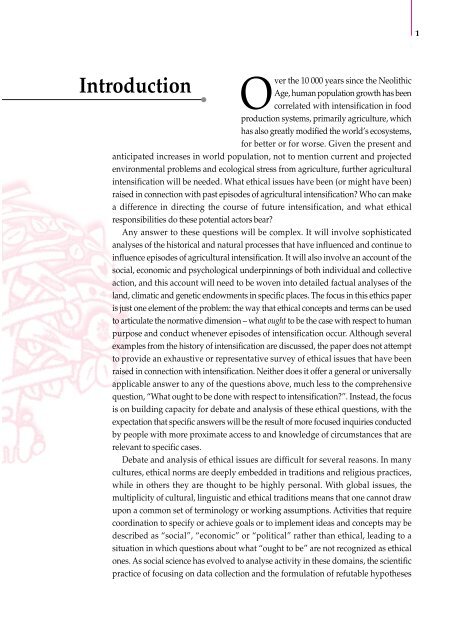Ethics of Sustainable Agricultural Intensification - FAO.org
Ethics of Sustainable Agricultural Intensification - FAO.org
Ethics of Sustainable Agricultural Intensification - FAO.org
You also want an ePaper? Increase the reach of your titles
YUMPU automatically turns print PDFs into web optimized ePapers that Google loves.
Over the 10 000 years since the NeolithicIntroductionAge, human population growth has beencorrelated with intensification in foodproduction systems, primarily agriculture, whichhas also greatly modified the world’s ecosystems,for better or for worse. Given the present andanticipated increases in world population, not to mention current and projectedenvironmental problems and ecological stress from agriculture, further agriculturalintensification will be needed. What ethical issues have been (or might have been)raised in connection with past episodes <strong>of</strong> agricultural intensification? Who can makea difference in directing the course <strong>of</strong> future intensification, and what ethicalresponsibilities do these potential actors bear?Any answer to these questions will be complex. It will involve sophisticatedanalyses <strong>of</strong> the historical and natural processes that have influenced and continue toinfluence episodes <strong>of</strong> agricultural intensification. It will also involve an account <strong>of</strong> thesocial, economic and psychological underpinnings <strong>of</strong> both individual and collectiveaction, and this account will need to be woven into detailed factual analyses <strong>of</strong> theland, climatic and genetic endowments in specific places. The focus in this ethics paperis just one element <strong>of</strong> the problem: the way that ethical concepts and terms can be usedto articulate the normative dimension – what ought to be the case with respect to humanpurpose and conduct whenever episodes <strong>of</strong> intensification occur. Although severalexamples from the history <strong>of</strong> intensification are discussed, the paper does not attemptto provide an exhaustive or representative survey <strong>of</strong> ethical issues that have beenraised in connection with intensification. Neither does it <strong>of</strong>fer a general or universallyapplicable answer to any <strong>of</strong> the questions above, much less to the comprehensivequestion, “What ought to be done with respect to intensification?”. Instead, the focusis on building capacity for debate and analysis <strong>of</strong> these ethical questions, with theexpectation that specific answers will be the result <strong>of</strong> more focused inquiries conductedby people with more proximate access to and knowledge <strong>of</strong> circumstances that arerelevant to specific cases.Debate and analysis <strong>of</strong> ethical issues are difficult for several reasons. In manycultures, ethical norms are deeply embedded in traditions and religious practices,while in others they are thought to be highly personal. With global issues, themultiplicity <strong>of</strong> cultural, linguistic and ethical traditions means that one cannot drawupon a common set <strong>of</strong> terminology or working assumptions. Activities that requirecoordination to specify or achieve goals or to implement ideas and concepts may bedescribed as “social”, “economic” or “political” rather than ethical, leading to asituation in which questions about what “ought to be” are not recognized as ethicalones. As social science has evolved to analyse activity in these domains, the scientificpractice <strong>of</strong> focusing on data collection and the formulation <strong>of</strong> refutable hypotheses1
















